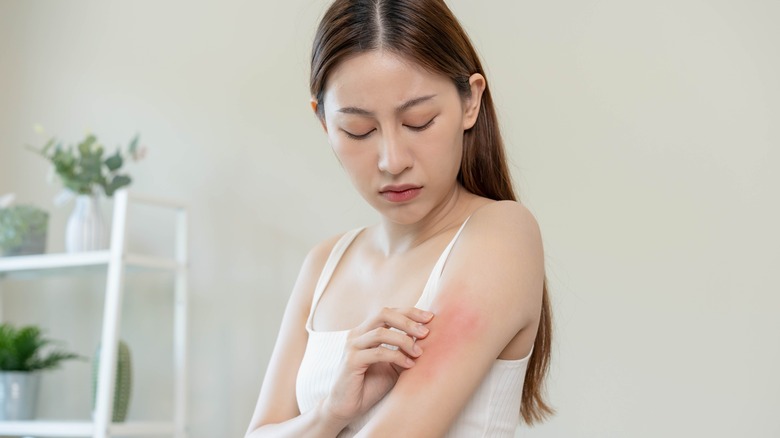Manage Your Eczema The Right Way During Warmer Trigger Months
Eczema, or atopic dermatitis, is a skin condition that affects approximately 31.6 million Americans. It can occur at any age, although it is most commonly diagnosed in childhood (via the National Eczema Association). When you have eczema, dealing with the dry, itchy, and inflamed patches of skin the condition causes can be frustrating. These symptoms might be more severe with seasonal changes.
As the seasons change, so does the environment around us – and for people with eczema, this can mean unpredictable flare-ups and discomfort. Winter can be a particularly challenging time for those with eczema, as the dry, indoor air can strip the skin of its natural moisture, says Healthline. In contrast, the warmer months of the year can also be challenging. Eczema flare-ups during the summer can be caused by a variety of factors, and managing the condition can be tricky. That said, understanding common summer triggers can help you formulate a plan to avoid or minimize your exposure. Let's dig in further.
What causes eczema flare-ups during summertime?
Heat and humidity are among the most common causes of eczema flares during summer. High temperatures can cause the skin to sweat, causing a prickly itch. According to a 2020 review published in the International Journal of Molecular Science, sweat and scratching can aggravate eczema. Exposure to certain allergens is another triggering factor. People allergic to tree and grass pollens, for example, may experience increased eczema symptoms during spring and summer, as Medical News Today explains.
Sun exposure can also be a trigger. For some people, the sun's rays can make the skin more prone to irritation and itching and can increase the chances of sunburn, according to Medical News Today. Finally, many people may enjoy the common activity of swimming in chlorinated pools during the summer. Unfortunately, the chemicals used to keep pool water clean can cause a condition known as irritant contact dermatitis, says the National Eczema Society.
How to manage eczema during the warmer months?
Because high temperatures can aggravate eczema symptoms, staying cool and comfortable is important. WebMD advises wearing lightweight, breathable clothing made of natural fibers like cotton to help reduce sweating and irritation.
Since dry skin is another common trigger for eczema flare-ups, keeping your skin hydrated is also important. Medical News Today recommends using sunscreen when outdoors, and choosing only fragrance-free products. The American Academy of Dermatology Association (AADA) also advises using lukewarm water to shower and limiting showers to once daily. As pool chemicals can also contribute to dryness and irritation, be sure to always rinse yourself thoroughly after swimming, and moisturize your skin afterward.
Minimizing your exposure to allergens like pollen is also important. So, as much as you may love the feeling of the fresh breeze on your face, you might want to keep your home and car windows closed, and stay inside during times of high pollen, via Everyday Health.
If the above preventative measures don't work, the AADA also advises using a hydrocortisone cream. This is a topical medication commonly used to treat eczema that works by reducing inflammation and itching, says WebMD.



